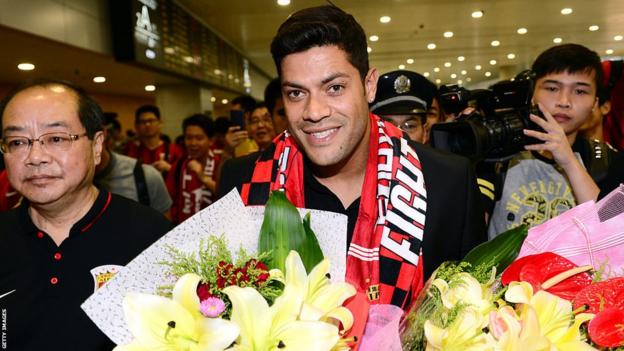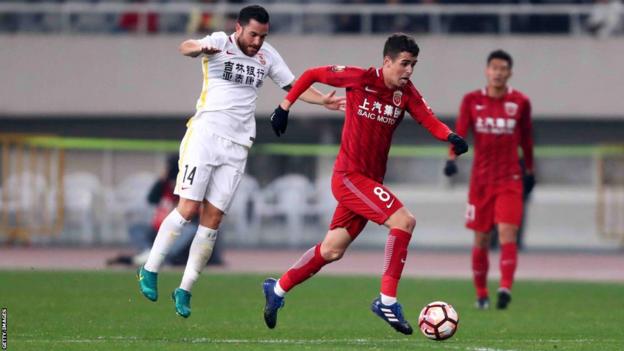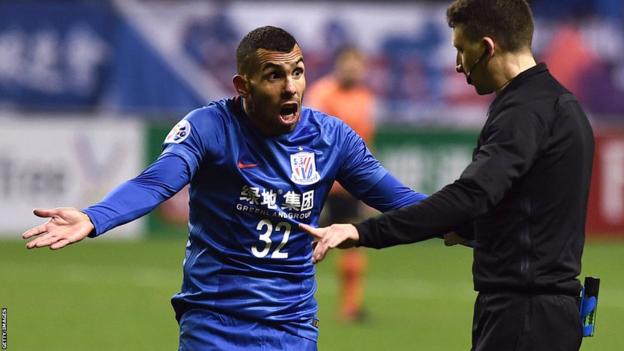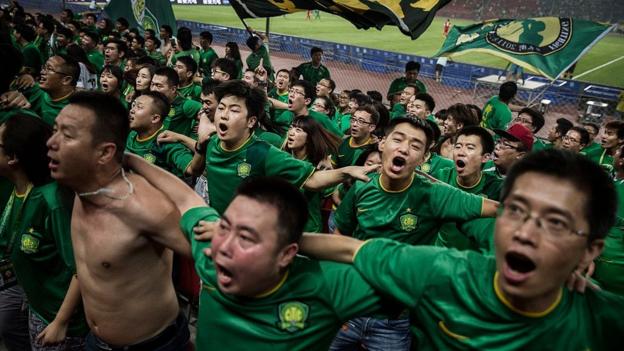Chinese Super League: From bidding for Bale to selling the team bus
Last updated on .From the section Football


Sign up for notifications to the latest Insight features via the BBC Sport app and find the most recent in the series.
In June 2016, hundreds of fans gathered at Shanghai airport to watch one of the most famous footballers in the world make the city his home.
Hulk, a 29-year-old Brazil international at the peak of his powers, had been signed by Shanghai SIPG manager Sven-Goran Eriksson for more than £46m and would earn reported wages of £320,000 a week.
As he strode through arrivals, a welcoming bouquet of flowers was thrust into his arms and a Shanghai SIPG scarf draped over his neck.
Over the next three years, he was joined by other big names, signed for even bigger price tags.
Chelsea star Oscar arrived six months later. The transfer fee was about £60m, while his wages were believed to be £400,000 a week.
Carlos Tevez, who had won the Premier League with Manchester United and City, reportedly earned even more when he joined.
Paris St-Germain star Ezequiel Lavezzi,Liverpool target Alex Teixeira and Colombia striker Jackson Martinez were also lured with astronomical transfer fees and bumper pay cheques.
The rise of the Super League came alongside President Xi Jinping's wish to turn the country into a footballing nation. In 2011, he announced plans for the men's national team to qualify for a World Cup and for China to eventually host the tournament.
As the Chinese Super League began spending large sums of money, his ambition to turn the nation into a football super power started to look very real.
"The Chinese market is a danger for all teams in the world, not only for Chelsea," said the Blues manager Antonio Conte at the time on seeing Oscar head east.
"China looks to have the financial power to move a whole European league to China," said Arsenal counterpart Arsene Wenger.
Less than a decade on, though, and the movement is in the opposite direction, with the bubble bursting and players leaving.

Jack Sealy was not one of the big-name arrivals. The son of former QPR striker Tony Sealy, he signed for CSL's Changchun Yatai in December 2015.
Sealy, then 28, had been playing in Hong Kong and was drawn to the Super League by the big names, the higher standard of football and the money that came with it.
"I went out there while it was still growing so it was very exciting to be around," he told the BBC.
"People had kind of heard about it before but no one really knew about it. And then as soon as you said to someone who knew football, they were like: 'Oh wow, you're going to the Super League.'
"I have no regrets about it at all. It was amazing."

Amazing, but also strange.
"You kind of have to just completely forget who they are," he added of some of his big-name opposition.
"I've made the step up or they made the step down, however you see it, and you just have to see them as equals and try your best. But it was pretty surreal.
"Oscar - I've watched him play with Chelsea - and obviously from playing Fifa, you know all of the players. It was pretty incredible."
By 2019, the league had become so big that Real Madrid's Gareth Bale - at one point the most expensive player in the world - was tipped for a move to Jiangsu Suning on a three-year, £1m-a-week contract.
Less than two years later, Jiangsu Suning ceased operating with their financial situation so bad that they even auctioned off the team's bus for cash.
How did the Chinese football scene implode so spectacularly?
Things went downhill when China's Football Association, which had already introduced a 'luxury tax' that made big-money transfers prohibitively expensive and banned sponsors from naming teams after themselves, announced a salary cap in December 2020.
At the time, the CFA said it hoped the move would "curb money football" and provide an "investment bubble" in the Chinese national team.
For some time, China's sport administration had been wary of the league's spending. In 2017, it vowed to curb spending and control "irrational investment", accusing clubs of "burning money" and paying foreign players with "excessive salaries".
The salary cap certainly had the desired effect. The limit meant overseas players would only be able to earn a maximum of £52,000 a week, far lower than the contracts previously offered to star names.
Some teams needed such restraints having piled up debts via their big spending.
A large number of clubs' troubles were also exacerbated by their owners' growing problems in China' real estate sector with several home-building giants running into cash flow problems.
On top of everything, the Covid pandemic hit.
China's strict containment policies reduced fixture lists and kept whatever games were staged behind closed doors for more than two years. Broadcast and sponsorship revenues duly plunged.

Bosnia-Herzegovina defender Samir Memisevic played for Hebei FC from February 2020 - but by his second season at the club, could tell there were issues behind the scenes.
"The second season, I thought that something was wrong," he told the BBC.
"After a few months, financial problems started. Then they had a big problem with the Chinese players - they didn't pay them for a lot of months and I was sure that at the end of that year Hebei would not exist any more."
Memisevic received and accepted an offer to go on loan to Beijing Guoan, one of the top clubs in the league.
Hebei, who had signed Lavezzi and former Premier League regulars Javier Mascherano and Gervinho during the CSL's boom times, scrapped their youth teams in a desperate bid to survive.
Some employees, furloughed without pay for months, offered to work for free as the club, owned by a debt-ridden real estate company, struggled to pay its utility bills.
It was all in vain though. Earlier this year, Hebei disbanded.
"I just feel so sorry for Hebei and what happened because they were one of the biggest teams with loads of big names and money," said Memisevic, who now plays for Al-Nasr in Dubai.
"Now it's just disappeared.
"It's really sad but it's been a thing at a lot of Chinese clubs. I've seen that Guangzhou and Wuhan are also disappearing. It's just really sad.
"I hope that Chinese football will get better because they put a lot of money into it. But I don't think it will be the same like before."
For John Hassett, the Chinese Super League will not be the same without his favourite team, Guangzhou City. The club, which has been managed by Eriksson and former Arsenal and Rangers star Giovanni van Bronckhorst in the past, also disbanded in March.
Every home game, Hassett looked forward to meeting fellow fans and joining them to cheer on the team.
"For lots of people, the social side was as important as the football," he told the BBC.
"We had this tiny little shop outside the ground, so we'd drink there before and after the game. It had also become the haunt of the local Chinese fan group after the game. It became quite a spot.
"We were all gutted. We did a little wake for the club at our beer shop after it closed down. We met up with a couple of other groups and had a beer outside the stadium. It was good fun.
"Part of the problem is that none of the clubs had set themselves up to make money.
"Tickets are very cheap. Our season ticket was £50 or £60. Some of the student groups were buying tickets cheaper than that. Most people don't buy the official shirts, they got them outside the stadium for £3.
"Revenue generation for clubs is the biggest problem the Super League will have. As the economy tightens, where does the money come from?"
Late last year, as the countdown to reopening stadiums to fans began, another question was being asked; where has the money gone?
A corruption scandal spread through the highest offices of the domestic game.
Former Everton midfielder and ex-head coach of China's men's team, Li Tie, was investigated for "serious violations of the law", with charges of bribery brought in August.
Chen Xuyuan, the Chinese Football Association's former chairman, is facing similar accusations while South Korea midfielder Son Jun-ho, who played for Shandong Taishan, has been detained since May on suspicion of accepting bribes.
Now, only a small number of foreign players remain in the league. Those currently playing in China, both local and foreign players, did not respond to interview requests from the BBC.
But despite the league's problems, there is still a demand for domestic football.
When tickets for Beijing Guoan's first match back in front of a crowd went on sale in April, they sold out within five minutes.

Alberto Doldan, who has worked in China with La Liga and made deals in Asia as an agent, said that the aggressive acquisition of talent by top teams in Saudi Arabia currently is reminiscent of the CSL's peak.
But he insists that the Chinese league still has a future, even if it is different from the one that once seemed possible.
"Many teams in China have disappeared due to financial problems," he told the BBC.
"But I think the future will be better because they've been working with young players. I think in the next five, six or seven years, we'll get more local players with a higher level.
"China is still a good place. I think the future is in the local players."
Now with fewer, flown-in superstars, the focus is on producing more homegrown superstars to grow the league and improve China's prospects at the World Cup, a tournament which, on the men's side, they have qualified for only once.



































